
The chachalacas, guans and curassows are birds in the family Cracidae. These are species of tropical and subtropical Central and South America. The range of one species, the plain chachalaca, just reaches southernmost parts of Texas in the United States. Two species, the Trinidad piping guan and the rufous-vented chachalaca occur on the islands of Trinidad and Tobago respectively.

The Ulidiidae or picture-winged flies are a large and diverse cosmopolitan family of flies (Diptera), and as in related families, most species are herbivorous or detritivorous. They are often known as picture-winged flies, along with members of other families in the superfamily Tephritoidea that have patterns of bands or spots on the wings. Some species share with the Tephritidae an unusual elongated posteroapical projection of the anal cell in the wing, but can be differentiated by the smoothly curving subcostal vein. Two species, Tetanops myopaeformis and Euxesta stigmatias, are agricultural pests.
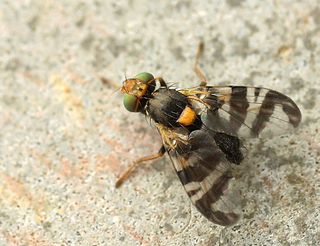
Rhagoletis is a genus of tephritid fruit flies with about 70 species.
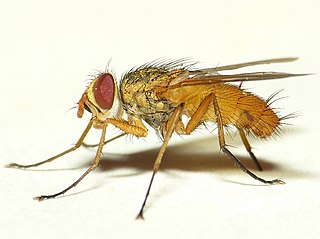
Leskia is a genus of flies in the family Tachinidae.
Rhagoletis flavicincta is a species of tephritid or fruit flies of the family Tephritidae found in Eastern Europe and Asia.
Rhagoletis juniperina is a species of tephritid or fruit flies in the genus Rhagoletis of the family Tephritidae.

Rhagoletis suavis, also known as the walnut husk maggot, is a species of tephritid or fruit fly in the family Tephritidae. This fly is closely related to, but not to be confused with, Rhagoletis juglandis, or the walnut husk fly. It occurs in North America.
Chaetopsis aenea is a species of ulidiid or picture-winged fly in the genus Chaetopsis of the family Ulidiidae.
Euxesta basalis is a species of ulidiid or picture-winged fly in the genus Euxesta of the family Ulidiidae. It was described by Francis Walker in 1853.
Ortalis is an historic genus of Ulidiid or picture-winged flies, first described by Fallén in 1810. It served as the type genus for the family Ulidiidae, which was called Ortalidae at the time. In 1932, it was pointed out by Adlrich that the name Ortalis was preoccupied by a genus of birds which had been named by Merrem in 1786. The name of the fly family was therefore revised, with some authors calling it Otitidae until Ulidiidae was settled on as standard. The genus itself was found to be paraphyletic, and all of its species have been reassigned to other genera, some in the Ulidiidae, and some in other Tephritoid families. In the following list, the species are organized according to the families and genera to which they have been reassigned.
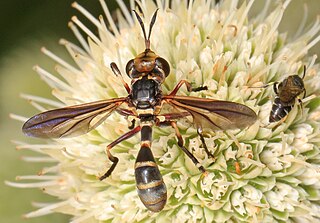
Physoconops is a genus of thick-headed flies in the family Conopidae. There are about 13 described species in Physoconops.
Diplonevra is a genus of scuttle flies. There are at least eight described species in Diplonevra.
Neorhynchocephalus is a genus of tangle-veined flies in the family Nemestrinidae. There are about eight described species in Neorhynchocephalus.

Chrysanthrax is a genus of bee flies in the family Bombyliidae. There are more than 50 described species in Chrysanthrax.

Hedriodiscus is a genus of soldier flies in the family Stratiomyidae. There are more than 20 described species in Hedriodiscus.
Stonyx is a genus of bee flies, insects in the family Bombyliidae. There are about five described species in Stonyx.
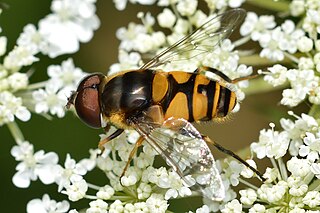
Eristalis transversa, the transverse-banded flower fly, is a species of hoverfly. It occurs in the eastern United States and Canada, where it is abundant and conspicuous. It flies from early April to late October in a wide variety of habitats.
Dolichomyia is a genus of bee flies in the family Bombyliidae. There are about seven described species in Dolichomyia.
Automola is a genus of flies in the family Richardiidae. There are at least three described species in Automola.
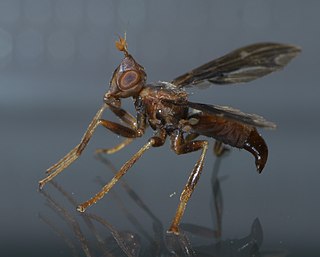
Pyrgota is a genus of flies in the family Pyrgotidae. There are about 10 described species in Pyrgota.









